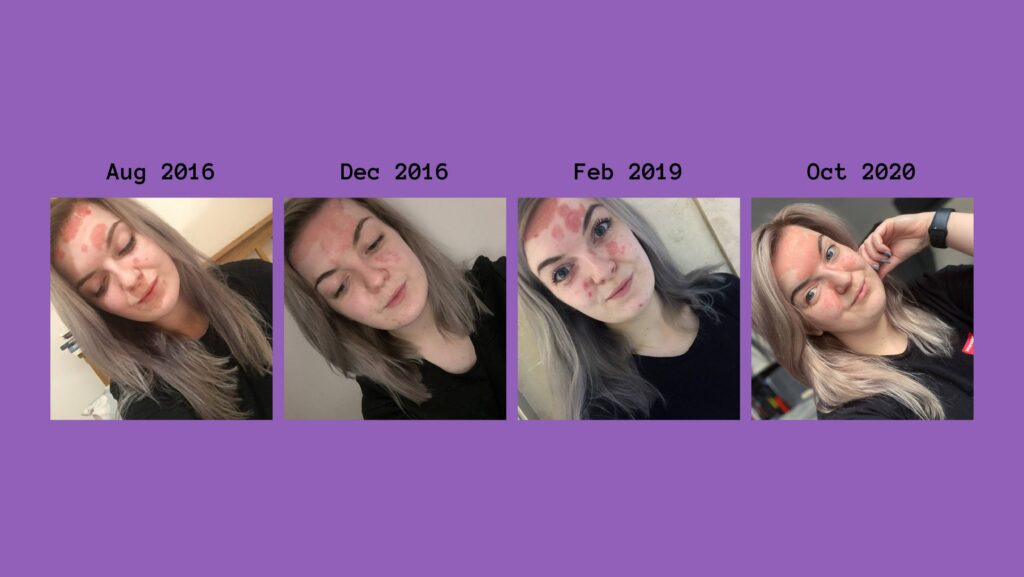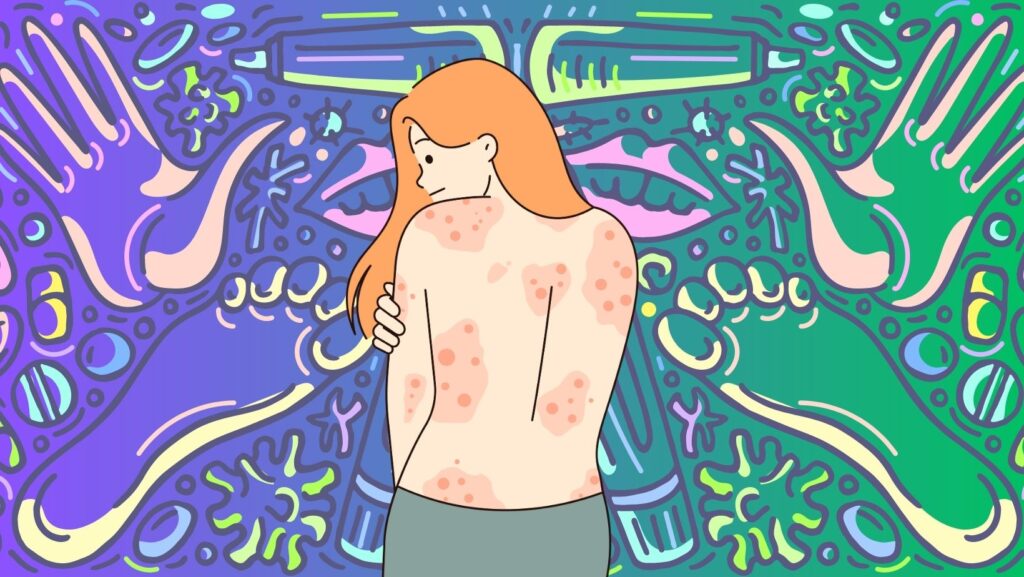“I thought you had to be pretty to work here” was the worst thing said to Jude Duncan, a 30-year-old psoriasis advocate from Glasgow when she was working at a department store beauty counter. She had red, inflamed, and scaly psoriasis patches running down her face, from her forehead to her right cheek. Diagnosed 10 years ago, Jude got used to the stares, rude remarks and unsolicited advice on treatment options, but it is still a constant struggle.
Living with a chronic skin illness like psoriasis can be extremely difficult. It takes a toll on your physical and mental health. Affecting 2 in 100 people in the UK, psoriasis is one of the UK’s most common skin diseases, often developing in adults between the ages of 20-30, and 50-60.
Psoriasis causes itchy, often painful inflamed scales on the skin called plaques. But it’s not just the physical discomfort of the condition and the time it takes to manage it, it’s also how it interferes with people’s social behaviour, mental health and quality of life.
“It’s the stigma and judgement surrounding the condition that makes it more of a struggle than it already is trying to get the condition under control,” says Jude.
Here are six myths busted by Jude and Dr. Mary Sommerlad, a London-based consultant dermatologist.
#1 Myth: Psoriasis is contagious
BUSTED:
Psoriasis isn’t a contagious disease, so even if you touch someone’s plaques with your bare skin, you’re not going to catch it.
“Psoriasis is a chronic inflammatory skin disease caused by a complex interplay between one’s genetics, immune system and environment. As there is a genetic component, psoriasis can run in families, but again this is genetic and not infectious,” says Dr Sommerlad.
As if people with psoriasis don’t feel isolated enough, Jude says the stress was heightened during the pandemic when people assumed her condition was potentially a side effect of Covid and that it was contagious. “I had a really bad flare and [people’s assumptions] had a huge impact on my mental health to a point where I often chose not to go out because I didn’t want to have to deal with that mentally.”
#2 Myth: There is a cure
BUSTED:
There is no magic cure for psoriasis. However, psoriasis flares can be avoided with “a combination of lifestyle choices and medical intervention,” according to Dr Sommerlad. “Stress and alcohol consumption are known to exacerbate psoriasis so keeping alcohol to an absolute minimum and managing stress levels is crucial. Smoking and consuming ultra-processed foods are also pro-inflammatory, so it’s good to quit these too.”
Ultimately, it’s important to seek good quality advice from a consultant dermatologist on medical management as different people have different needs.
According to Jude, who’s been living with psoriasis for 10 years now, people normally recommend creams and dietary changes to “cure” it, which can be very demoralising. “You can have the best intentions in the world, but if you find yourself having a conversation where you’re going to suggest some form of treatment, just stop,” says Jude. “What people don’t realise is that they’re just going to make that person feel self-conscious about something they’re probably already insecure about.”

#3 Myth: Psoriasis is just red, dry and itchy skin
BUSTED:
Not exactly. Psoriasis may look different depending on skin colour. The lack of proper diagnosis in patients of colour affects the prevalence of skin conditions in different communities. “Inflammation in people of colour presents itself as an increase in pigmentation, as inflammation drives melanin production. Increased pigmentation, known as hyperpigmentation, masks the redness of the inflammation, so will make psoriatic plaques look darker than the original skin colour rather than pink or red,” says Dr Sommerland.
With that said, it still varies case by case. It’s important to remember that because black skin comes in many different shades, there’s no “rule” for how psoriasis will appear on people of colour.
#4 Myth: It only affects the skin
BUSTED:
It goes beyond the skin. Most people assume psoriasis only affects what is visible to them, but the truth is “it can affect the nails, making them thickened, prone to breakage and yellowing. It can also affect the joints and the ligaments,” says Dr Sommerlad.
Jude was diagnosed with psoriatic arthritis which causes severe joint swelling in 2018, stiffness and muscle sores, in addition to thick skin plaques. “Living with psoriasis and psoriatic arthritis is a lot of creams, medication, stiffness and soreness and unexplained skin and sore muscle things,” says Jude. “It’s also about being constantly aware to add time to actually commute to places or do certain things. It’s about having to think about what you’re wearing, whether my cream’s going to seep through or if my patches are going to show and if it’s a conversation I want to have with people that night.”
#5 Myth: Bad hygiene causes psoriasis flare-ups
BUSTED:
It has nothing to do with bad hygiene. Flare-ups happen when there is a trigger, which can mean different things to different people. “Bad hygiene doesn’t cause psoriasis but factors leading to poor hygiene like stress, a chaotic lifestyle, and substance misuse can exacerbate psoriasis as living in a state of stress is pro-inflammatory,” says Dr Sommerlad.
Other common triggers are streptococcal sore throats, alcohol, certain medications and even infections or injuries.
#6 Myth: All you need is moisturising creams
BUSTED:
Treating psoriasis isn’t as easy as applying thicker lotions and new creams to soothe flare-ups. The aim is to reduce inflammation, target specific parts of the inflammatory pathway and slow the growth of skin cells. “The good news is that there are several options, like phototherapy, oral and injectable medications for those not responding to creams,” according to Dr Sommerlad.
“Each option needs to be personal to the individual, and it is definitely worth speaking to a consultant dermatologist to explore all your options before making any decisions. There are new therapies every year, so even if you’ve been seen in the past and sold there was not much that could be done for you, that situation may now have changed.”
Ada Ooi, a certified holistic acupuncturist and expert in traditional Chinese medicine (TCM) told SKiN about the TCM approach to psoriasis treatment which combines lifestyle changes, acupuncture and oral medication.

